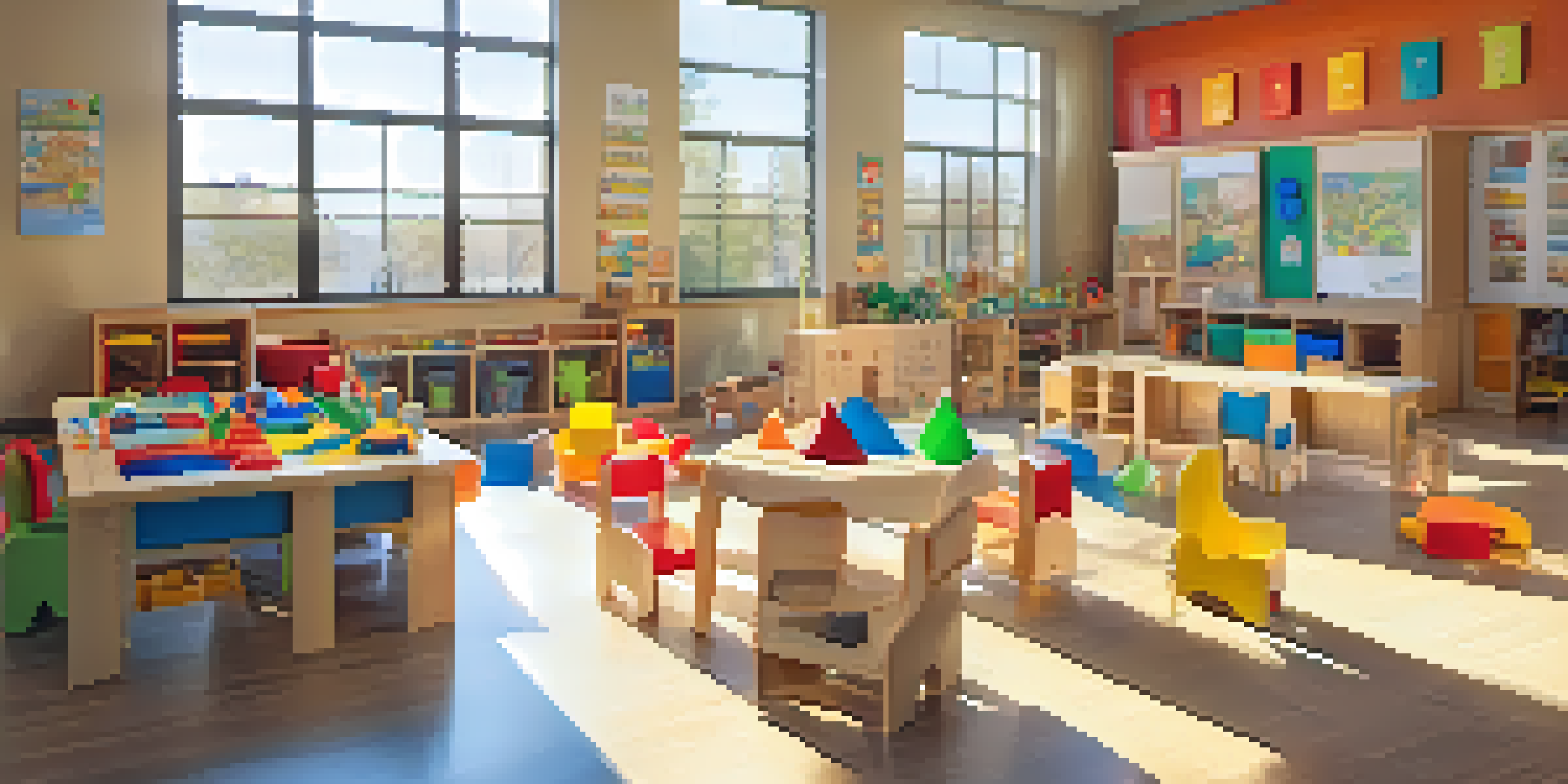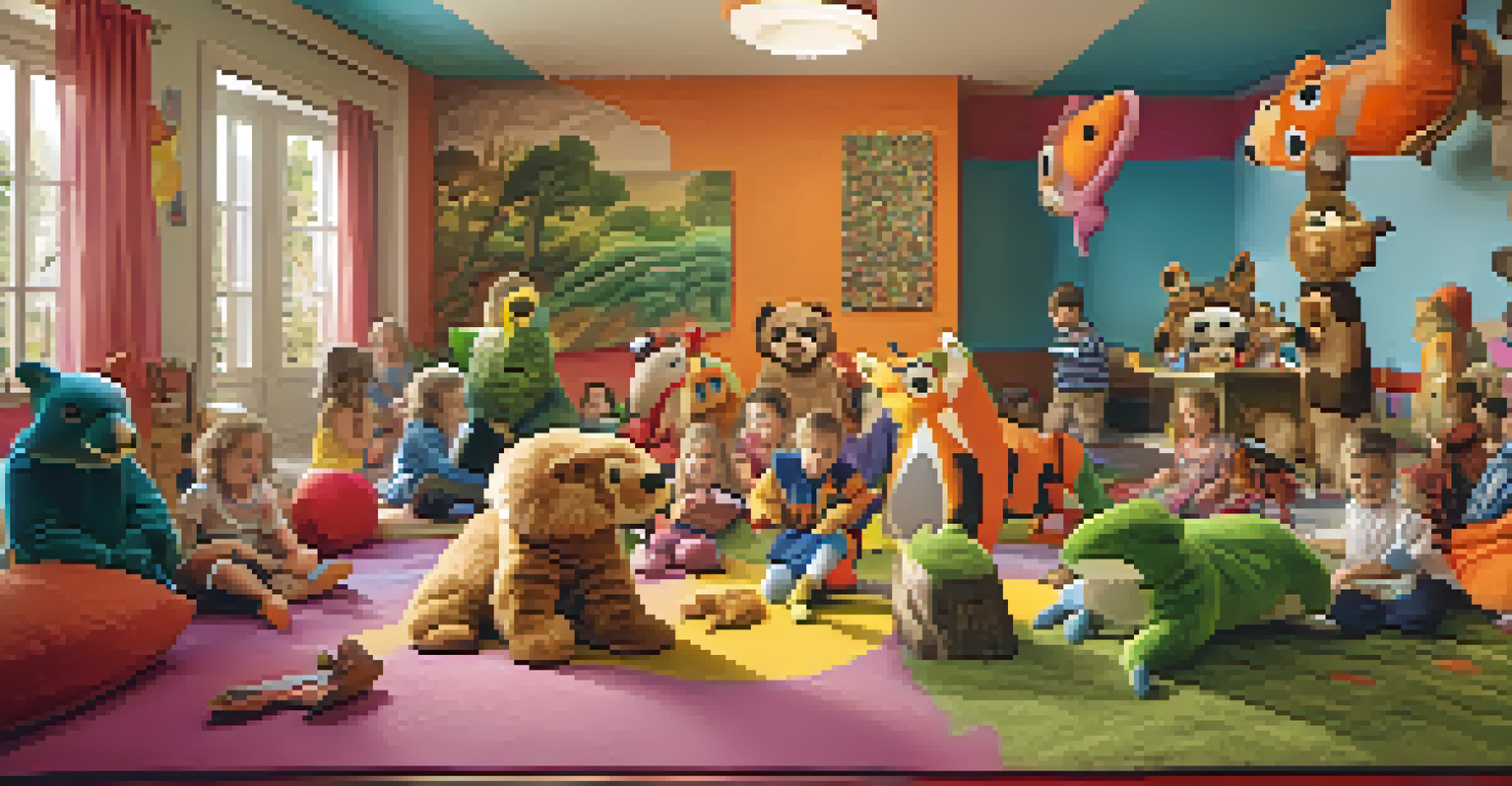The Role of Play in Early Childhood Curriculum Development

Understanding Play as a Learning Tool in Early Childhood
Play is more than just fun; it's a fundamental part of how young children learn. Through play, children explore their environment, develop critical thinking skills, and express their creativity. For instance, when a child builds a tower with blocks, they are not just stacking; they are experimenting with balance and gravity.
Play is the highest form of research.
Furthermore, play encourages social interaction, allowing children to learn cooperation and communication skills. Whether they're playing dress-up or engaging in a group game, they practice sharing, taking turns, and resolving conflicts. These social skills are just as important as academic knowledge.
Incorporating play into the curriculum acknowledges that children learn best when they are actively engaged. This playful approach not only boosts their motivation but also fosters a love for learning that can last a lifetime.
Types of Play That Enhance Learning Outcomes
There are various types of play, each contributing uniquely to a child's development. For example, imaginative play, where children create scenarios and roles, promotes cognitive flexibility and problem-solving. It allows them to experiment with different perspectives and develop empathy.

Physical play is another critical aspect, helping children develop motor skills and coordination. Activities like running, jumping, or dancing not only improve physical health but also enhance brain function and concentration. This kind of play is essential for laying a strong foundation for more structured learning later on.
Play Enhances Learning and Growth
Play is a fundamental tool for children's learning, fostering critical thinking, creativity, and social skills.
Lastly, structured play, which involves games with specific rules or objectives, teaches children about teamwork and strategy. By navigating challenges within a safe environment, they build resilience and confidence, essential traits for lifelong success.
The Role of Educators in Facilitating Play
Educators play a crucial role in fostering a play-based learning environment. They can create spaces that encourage exploration and creativity, stocked with diverse materials that inspire children. An inviting classroom setup with various play stations can stimulate curiosity and engagement.
Children learn as they play. Most importantly, in play, children learn how to learn.
Moreover, teachers can guide play by asking open-ended questions or suggesting new ideas, helping children deepen their learning experiences. For instance, during a painting activity, a teacher might ask, 'What colors do you see in nature?' This not only sparks a conversation but encourages children to observe and think critically.
By observing children at play, educators can assess their developmental milestones and tailor activities to meet individual needs. This ongoing assessment helps ensure that each child’s unique strengths and interests are nurtured, promoting a holistic approach to learning.
Creating a Play-Friendly Curriculum Framework
A play-friendly curriculum integrates play into every learning area, making it a core component of education. This means designing activities that are playful yet educational, blending learning objectives with fun. For instance, a math lesson could involve counting items during a scavenger hunt.
Incorporating themes that resonate with children's interests can also enhance engagement. When children are excited about a topic, they are more likely to participate and learn deeply. A unit on animals could involve role-playing, art projects, and field trips to a zoo, all centered around playful exploration.
Educators Facilitate Play-Based Learning
Teachers play a vital role in creating engaging environments and guiding children's play to enhance their learning experiences.
Additionally, it's vital to include opportunities for both child-led and adult-guided play. This balance allows children to explore independently while also benefiting from structured learning that educators provide, ensuring a well-rounded educational experience.
The Impact of Play on Emotional Development
Play serves as a powerful tool for emotional development in early childhood. When children engage in play, they often express their feelings and work through complex emotions in a safe environment. Whether they are acting out scenarios or playing with peers, they learn to identify and manage their emotions effectively.
Through collaborative play, children also develop empathy. They learn to understand and respect others' feelings, which is crucial for building strong relationships. For example, when playing a game, they must consider their friends' perspectives and needs, fostering a sense of community.
Moreover, play helps children build resilience. When faced with challenges during play, they learn to cope with setbacks, developing a positive attitude toward problem-solving. This emotional strength is invaluable as they encounter various challenges throughout their lives.
Challenges in Implementing Play-Based Learning
While the benefits of play in early childhood education are clear, implementing a play-based curriculum can come with challenges. One major hurdle is the perception that play is merely 'fun' and not serious learning. Educators and parents may struggle to recognize the value of play alongside traditional teaching methods.
Another challenge is the pressure to meet academic standards. In a world focused on measurable outcomes, some educators may feel compelled to prioritize structured lessons over play. This can lead to a curriculum that neglects the essential role of play in fostering creativity and critical thinking.
Challenges in Play-Based Education
Despite its benefits, implementing a play-based curriculum faces challenges such as misconceptions about play and pressures for academic performance.
Finally, resource limitations such as insufficient materials or training can hinder the implementation of play-based learning. Educators need support and resources to create engaging environments that facilitate play, highlighting the necessity for investment in early childhood education.
The Future of Play in Early Childhood Education
As our understanding of child development evolves, the role of play in early childhood education is becoming increasingly recognized. More educational institutions are beginning to embrace play-based learning, integrating it into their curricula as a vital component of a child's development. This shift signals a growing appreciation for the holistic benefits of play.
Moreover, advancements in technology offer new opportunities for play that can enhance learning. Educational apps and games can complement traditional play, allowing children to explore concepts in innovative ways. However, it remains crucial to balance screen time with hands-on, interactive play.

Looking ahead, the challenge will be to maintain the essence of play in education while adapting to changing societal needs. By prioritizing play in early childhood curricula, we can cultivate a generation of innovative thinkers, problem solvers, and emotionally intelligent individuals ready to tackle the future.